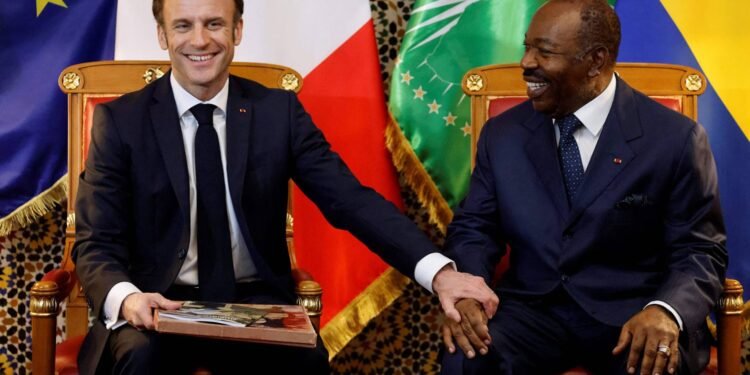On Wednesday, Gabon became the eighth African country in three years to face a coup. As these coups have unfolded, Foreign Policy has sought to explain the factors, from the colonial era to the present day, that have contributed to instability in the region.
On Wednesday, Gabon became the eighth African country in three years to face a coup. As these coups have unfolded, Foreign Policy has sought to explain the factors, from the colonial era to the present day, that have contributed to instability in the region.
The essays and reporting below examine the role that Western powers such as France, the United States, and the United Nations have played in the turn away from democracy in West and Central Africa. They also consider how the West might actually be able to help.—Chloe Hadavas
French President Emmanuel Macron (left) meets with Gabonese President Ali Bongo for a bilateral meeting at the presidential palace in Libreville, Gabon, on March 1.Ludovic Marin/AFP via Getty Images
France’s Concern for Gabon’s Democracy Is Too Little, Too Late
Paris is complicit in the lack of social and democratic progress that prompted the coup, FP’s Howard W. French writes.
Protesters cheer for Nigerien troops as they gather in front of the French Embassy in Niamey, Niger’s capital, during a demonstration in support of Niger’s new junta on July 30.AFP via Getty Images
Is Niger’s Coup the Sahel’s Last Straw?
Calls grow for Washington to reset its Africa strategy, but old habits die hard, FP’s Robbie Gramer reports.
Officers of the National Police of Niger stand guard with Nigerien soldiers during a demonstration outside the Nigerien and French air bases in Niamey on Aug. 27AFP via Getty Images
How U.N. Peacekeeping Accidentally Fuels Africa’s Coups
Foreign funds can produce stronger and less accountable militaries, Jamie Levin and Nathan Allen write.
People demonstrate in Niger’s capital, Niamey, to show their support for the coup plotters and Russia. Djibo Issifou/picture alliance via Getty Images
Does U.S. Military Training Embolden Coup Plotters in Africa?
FP’s Emma Ashford and Matthew Kroenig debate the issues that plague nations led by undemocratic regimes.
Protesters gather in front of the French Embassy following a rally in support of Niger’s junta in Niamey, Niger, on July 30.AFP via Getty Images
How the West Could Actually Help the Sahel
For years, Western policies have only paid lip service to seeing the Sahel in terms of its own immense problems, FP’s Howard W. French writes.















